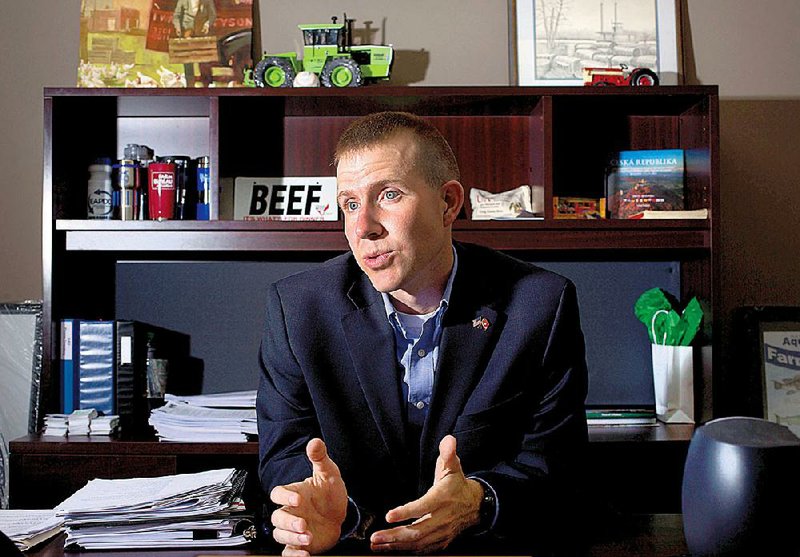Arkansas Agriculture Secretary Wes Ward remembers his first bull ride.
"It hurt when I hit the ground," he says, laughing. "You're prepared for it, you have an idea, but there's no way of comparing that to when you're sitting on top of a 2,000-pound animal and you feel it moving, and you just feel how strong it is and you're hanging on, and you nod your head and the gate opens up. It's a huge adrenaline rush."
Affable and soft-spoken, almost always smiling, Ward seems an unlikely adrenaline junkie. But he joined the U.S. Marine Corps after high school because, he says, he knew it was "the hardest branch" of the armed forces and he wanted a character-building challenge.
His challenges now come in the arena of agriculture policy, and his low-key public approach has been to emphasize cooperation and practical solutions to problems facing Arkansas farmers.
Take immigration, a political hot-button issue partly because of Donald Trump's claims that illegal aliens are threatening to destroy the country. Ward acknowledges the debate but says farmers' need for labor is pressing. He notes that state House Speaker Jeremy Gillam, R-Judsonia, recently said that about half of his blackberry crop would die on the vine because problems with the federal farmworker visa program make it hard to hire workers from Mexico.
"Agriculture certainly needs, whether it's an exception or some sort of visa program ... some method where agricultural producers can bring in the workers they need in order to harvest their crops," Ward says.
Climate change is another area where Ward stresses practical problem-solving. Ward says the University of Arkansas System Division of Agriculture research and Cooperative Extension centers are doing important work to make crops more resistant to threats such as drought, wind and pests.
"If it is or isn't climate change, we're always preparing for change and trying to adapt to changing circumstances," he says.
Gov. Asa Hutchinson named Ward to lead the Agriculture Department in March, passing over the state Agriculture Board's nominee. The secretary serves at the pleasure of the governor.
Aubra Anthony of El Dorado, the board chairman, says he's been pleased by the job Ward has done.
"He's a very bright person," Anthony says. "He seems to be very well-grounded and has an easy personality, and that helps him work with other people."
Randy Veach of Manila, president of the Arkansas Farm Bureau, agrees that Ward's personality has helped him in his new role, noting Ward held meetings with farmers around the state to solicit their opinions.
"He's very willing to listen," Veach says. "He didn't come in with an agenda and start changing things."
Ward, 33, grew up in Lake City in Craighead County, where his father was a Baptist preacher and his mother a registered nurse. A graduate of Arkansas State University in Jonesboro, where he rode bulls as part of the rodeo team, he holds a bachelor's degree in agricultural business and a master's degree in agricultural and food law from the University of Arkansas at Fayetteville. Ward also serves as a captain and civil affairs officer in the U.S. Marine Corps Reserve.
He worked as a field coordinator in 2013 for U.S. Rep. Rick Crawford, R-Ark., doing agricultural-related work, and ran unsuccessfully as a Republican for county judge of Craighead County in 2014.
As agriculture secretary, Ward runs a department created by the Arkansas Legislature in 2005 through a merger of the state Plant Board, the Forestry Commission, the Livestock and Poultry Commission and other agencies.
Asked to name his priorities, Ward lists preparing for an avian influenza outbreak that could endanger poultry flocks when migratory waterfowl head south for the winter; helping farmers adjust to lower commodity prices and land values; and encouraging young people, especially former military service members, to consider farming as a career.
Looking for ways to expand foreign markets for Arkansas-produced crops has been a particular emphasis of his first six months on the job. Ward went to the Dominican Republic in June, and he will accompany Hutchinson to Cuba later this month. He plans trips to Africa and Mexico in November. He also hosts foreign agriculture officials visiting the state.
"Arkansas is the No. 1 producer of rice and a leading producer of poultry, and rice and poultry are staples across the globe," he says. "There are very few places anywhere in the world where Arkansas can't open up a market."
Business on 09/15/2015
